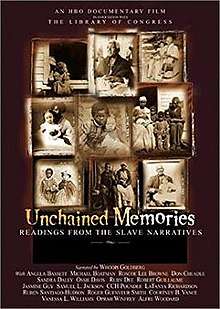Unchained Memories
Unchained Memories: Readings from the Slave Narritives is a 2003 American documentary film about the stories of former slaves interviewed during the 1930s as part of the Federal Writers' Project and preserved in the WPA Slave Narrative Collection. This HBO film interpretation directed by Ed Bell and Thomas Lennon[2] is a compilation of slave narratives, narrated by actors, emulating the original conversation with the interviewer. The slave narratives may be the most accurate in terms of the everyday activities of the enslaved, serving as personal memoirs of more than two thousand former slaves. The documentary depicts the emotions of the slaves and what they endured. The "Master" had the opportunity to sell, trade, or kill the enslaved, for retribution should one slave not obey.
| Unchained Memories | |
|---|---|
 DVD cover | |
| Directed by | Ed Bell and Thomas Lennon |
| Written by | Mark Jonathan Harris |
| Narrated by | Whoopi Goldberg |
| Distributed by | HBO |
Release date | 2003 |
Running time | 75 minutes |
| Country | United States |
| Language | English[1] |
History
The largest collection of slave narratives emerged from the Federal Writers' Project. Created by the Federal Government under the WPA to reduce unemployment during the 1930s, one component of the Federal Writers' Project involved interviews with thousands of former slaves in 17 states. The oral history interview project yielded an extraordinary set of 2,300 autobiographical documents known as the Slave Narrative Collection. What emerged from these documents were pictures of living standards, the daily chores, and long days, along with stories of the good and bad "Master." The brutality, torture, and abuse under slavery are themes in the interviews.
After the Civil War ended in 1865, more than four million slaves were set free. The main objectives were to inform the public and describe the history and life of the former slaves. More than 2,000 slave narratives along with 500 photos are available online at the Library of Congress as part of the "Born in Slavery" project.[3]
Slaves and readers
- Narrated by: Whoopi Goldberg
- Sarah Gudger, North Carolina (Vol. 11)— read by LaTanya Richardson
- Charley Williams, Oklahoma (Vol. 13) – read by Ruben Santiago-Hudson
- Martin Jackson, Texas (Vol. 16) - read by Robert Guillaume
- Henry Coleman, South Carolina (Vol. 14) – read by Roscoe Lee Browne
- Jennie Proctor, Texas (Vol. 16) – read by Oprah Winfrey
- Elizabeth Sparks, Virginia (Vol. 17) – read by Angela Bassett
- Rosa Starke, South Carolina (Vol. 14) --
- Cato Carter, Texas (Vol. 16) – read by Roger Guenveur Smith
- Mary Reynolds, Texas (Vol. 16) – read by Angela Bassett
- Rev. Ishrael Massie, Virginia –
- Fannie Berry, Virginia – read by CCH Pounder
- Mary Estes Peters, Arkansas (Vol. 2) – read by Jasmine Guy
- Sarah Ashley, Texas (Vol. 16) – read by LaTanya Richardson
- Charles Grandy, Virginia — read by Ruben Santiago-Hudson
- Marshall Butler, Georgia (Vol. 4) - read by Samuel L. Jackson
- William Colbert, Alabama (Vol. 1) – read by Courtney B. Vance
- Katie Darling, Texas (Vol. 16) – read by Jasmine Guy Jasmine Guy
- Vinnie Brunson, Texas (Vol. 3) – read by Vanessa L. Williams
- Fannie Berry, read by CCH Pounder
- Jack & Rosa Maddox, Texas (Vol. 7) – read by Ossie Davis and Ruby Dee
- Mary Reynolds, Texas (Vol. 16) – read by Angela Bassett
- Louisa Adams, North Carolina (Vol. 11) – read by LaTanya Richardson
See also
References
- "Samuel Jackson Figures He Owes His Success to Morgan Freeman" (Fee required). The Deseret News. March 2, 1993. Retrieved January 24, 2010.
- Internet Movie Database website - Unchained Memories, accessed May 5, 2010.
- "Born in Slavery: Slave Narratives from the Federal Writers' Project, 1936-1938". Library of Congress. Retrieved 15 January 2019.
Further reading
- A Sketch of the Laws Relating to Slavery in the Several States of the United States of America. Stroud, George M. (George McDowell), 1795-187
- An Introduction to the WPA Slave Narratives. Yetman, Norman R.
- When I Was a Slave: Memoirs from the Slave Narrative Collection. Yetman, Norman R.
- Prison & Slavery - A Surprising Comparison. Gleissner, John D.